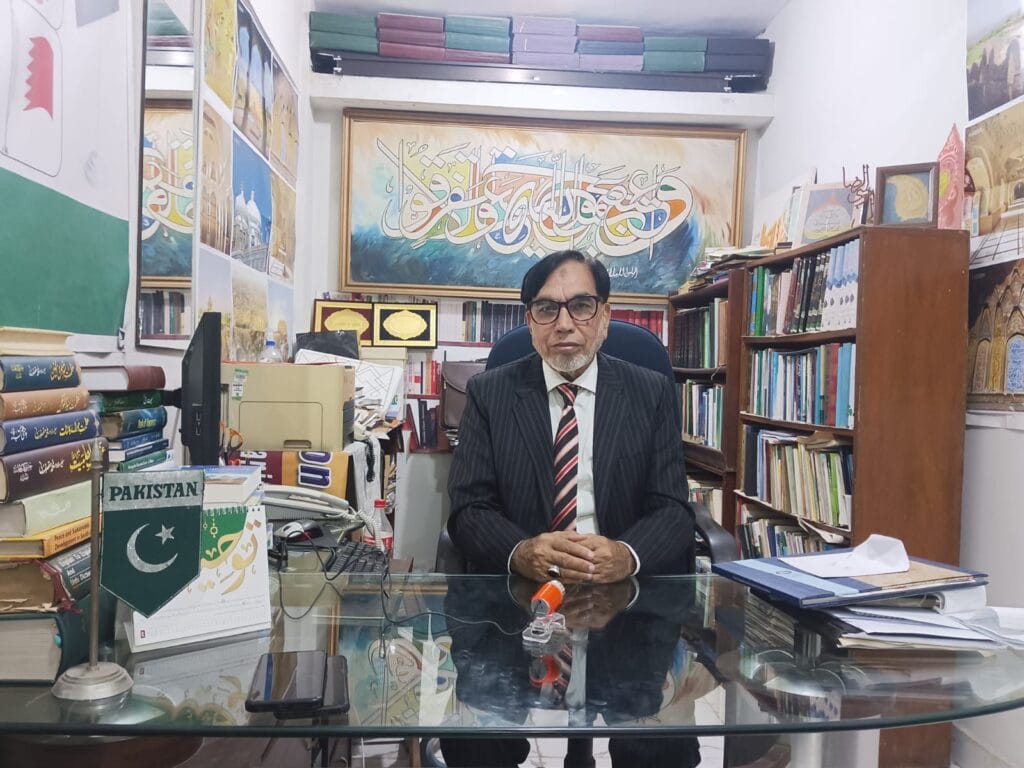Rasheed Ahmed Chughtai
The Significance of Honesty in Muslim Society
Rasheed Ahmed Chughtai

Islam, as a comprehensive way of life, places immense emphasis on honesty, a virtue that is deeply rooted in the teachings of the Noble Qur’an, the sayings of Prophet Muhammad (SAWS), and the sermons of Imam Ali (AS). Honesty is not merely a moral trait but a fundamental pillar of a Muslim’s faith and character. Allah (SWT) commands Muslims to be truthful and honest in all aspects of life, whether in words or deeds, privately or publicly. The Qur’an states:
“O you who believe! Fear Allah and be with those who are true (in word and deed).”** (Qur’an 9:119)
This verse underscores the importance of aligning oneself with truthfulness and integrity. The Prophet Muhammad (SAWS) further emphasized this by saying:
“Truthfulness leads to righteousness, and righteousness leads to Paradise. A man continues to tell the truth until he is recorded as truthful in the sight of Allah. Lying leads to wickedness, and wickedness leads to the Hellfire. A man continues to lie until he is recorded as a liar in the sight of Allah.”** (Sahih al-Bukhari)
Imam Ali (AS), known for his profound wisdom, also highlighted the value of honesty in his sermons:
“Honesty is the best companion, and truthfulness is the greatest treasure.” (Nahj al-Balagha)
Islam’s teachings sanctify every aspect of life, provided that actions are performed with honesty, justice, and pure intentions. The Qur’an obliterates the distinction between the sacred and the mundane, declaring that even the simplest acts, when done with sincerity and gratitude, become acts of worship:
“So eat of the sustenance which Allah has provided for you, lawful and good; and be grateful for the favors of Allah, if it is He whom you serve.” (Qur’an 16:114)
The Prophet Muhammad (SAWS) illustrated this by saying:
“The morsel of food that one places in the mouth of his wife is an act of virtue to be rewarded by Allah.”** (Sahih al-Bukhari)
This holistic approach to life ensures that every action, no matter how small, is imbued with spiritual significance when performed with honesty and righteousness.
The Implications of Honesty
Honesty encompasses a wide range of virtues, including truthfulness, sincerity, fulfilling promises, and giving rightful advice. It extends to performing one’s duties with excellence, whether under supervision or not, and ensuring that every individual receives their due rights without delay or hesitation.
The Qur’an emphasizes the importance of fulfilling promises and commitments:
“And fulfill the covenant of Allah when you have taken it, and do not break oaths after their confirmation while you have made Allah your witness. Indeed, Allah knows what you do.”** (Qur’an 16:91)
Imam Ali (AS) further elaborated on the importance of honesty in governance and leadership:
“The foundation of leadership is honesty. Whoever is dishonest in their dealings will never succeed in their rule.”** (Nahj al-Balagha)
Honesty is the antithesis of deceit, hypocrisy, and favoritism. It fosters trust, unity, and social harmony. The Prophet Muhammad (SAWS) warned against dishonesty, stating:
“Whoever deceives us is not one of us.”** (Sahih Muslim)
External and Internal Honesty
Honesty can be categorized into external and internal forms. External honesty is judged by others, while internal honesty is a matter of personal conscience and accountability before Allah (SWT). The Qur’an reminds us:
“And whether you conceal your word or make it clear, indeed, Allah is Knowing of that within the hearts.”** (Qur’an 67:13)
The Prophet Muhammad (SAWS) emphasized the importance of internal honesty, stating:
“Beware of the supplication of the oppressed, for there is no barrier between it and Allah.”** (Sahih al-Bukhari)
This internal honesty, or *taqwa* (God-consciousness), ensures that a Muslim remains truthful even when no one is watching. Imam Ali (AS) beautifully encapsulated this idea:
“The most honorable of deeds is to fulfill what is obligatory and to avoid what is forbidden.”** (Nahj al-Balagha)
Building Honesty in a Muslim**
Islam builds honesty through a combination of divine instructions, rational arguments, rewards, punishments, and practical exercises. Allah (SWT) commands honesty in the Qur’an:
“Indeed, Allah commands you to uphold justice and to do good and to give to relatives. And He forbids immorality and bad conduct and oppression. He admonishes you that perhaps you will be reminded.” (Qur’an 16:90)
The Prophet Muhammad (SAWS) reinforced this by saying:
“The believer is not a slanderer, nor a curser, nor abusive, nor indecent.” (Sunan al-Tirmidhi)
Imam Ali (AS) also stressed the importance of self-discipline in cultivating honesty:
“The most complete gift of Allah is a life based on knowledge and honesty.”** (Nahj al-Balagha)
Practical exercises like fasting during Ramadan instill internal honesty. The Qur’an states:
“O you who believe! Fasting is prescribed for you as it was prescribed for those before you, that you may attain taqwa (God-consciousness).” (Qur’an 2:183)
During Ramadan, a Muslim refrains from food, drink, and other desires, even when no one is watching. This practice strengthens self-control and internal honesty, as the only observer is Allah (SWT).
The Rewards of Honesty
Allah (SWT) promises immense rewards for those who uphold honesty:
“Indeed, the righteous will be in pleasure, and the wicked will be in Hellfire.” (Qur’an 82:13-14)
The Prophet Muhammad (SAWS) assured:
“The truthful and trustworthy merchant will be with the prophets, the truthful, and the martyrs on the Day of Judgment.”** (Sunan al-Tirmidhi)
Imam Ali (AS) also highlighted the eternal benefits of honesty:
“The reward of honesty is the pleasure of Allah, and the punishment of dishonesty is His wrath.” (Nahj al-Balagha)
Honesty is the cornerstone of a Muslim’s faith and character. It is a virtue that transcends personal, social, and spiritual realms, ensuring harmony, trust, and righteousness in society. The teachings of the Qur’an, the Prophet Muhammad (SAWS), and Imam Ali (AS) provide a comprehensive framework for cultivating honesty in every aspect of life. By adhering to these divine principles, Muslims can achieve both worldly success and eternal salvation.
“And say: My Lord, increase me in knowledge and honesty.” (Qur’an 20:114)
www.rachughtai.com

